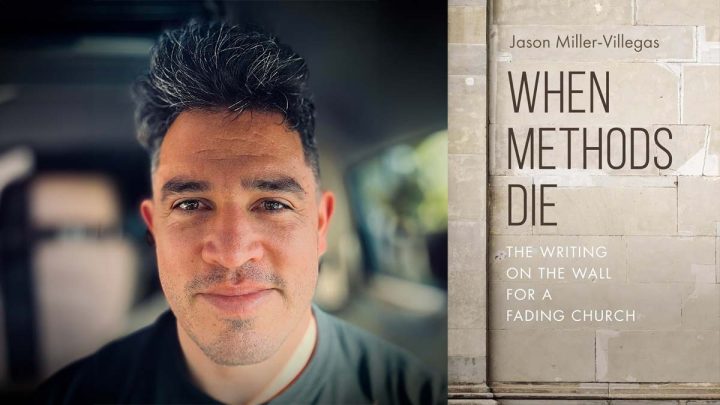Rev. Dr. Jason Miller-Villegas, NC Conference Director of Youth Ministries, has just published a new book, When Methods Die: The Writing on the Wall for a Fading Church.
When Methods Die: The Writing on the Wall for a Fading Church confronts the complex, often unspoken reality of a church in decline, exploring how traditions and structures that once brought life now contribute to stagnation. With a compassionate but candid voice, Jason Miller-Villegas walks readers through the hallways of a fading institution, inviting them to mourn what’s been lost, acknowledge the crisis, and rediscover hope in unexpected places. This book isn’t merely about mourning the past–it’s a call to embrace transformation, even resurrection, amid death. Each chapter reflects on the layers of legacy, fear, and resilience within the church, urging readers to see the potential for new life that lies in letting go. When Methods Die speaks to pastors, congregants, and anyone who believes that faith communities can thrive once more–not by clinging to the past, but by courageously stepping into the future.
The Rev. Dr. Jason Miller-Villegas got his start in ministry as a young high school student going through Lay Speaker training in his rural, NCCUMC home congregation in 2005, around the time he began exploring a call to pastoral ministry. Since then, he has served eight congregations in many lay and clergy roles. He currently serves as the NCC Director of Youth Ministry and also on the Resource Team of the ecumenical TENx10 youth ministry collaborative. Together with his wife, the Rev. Elizabeth, and their three children, they try to embody being a family on mission. Jason is passionate about challenging the Church to become more just, and he enjoys playing hockey in his spare time.
Excerpt from When Methods Die:
“YOU KNOW PASTOR, YOU are really good at funerals.” This sentiment, echoed in various ways throughout my career, often catches me off guard. While sometimes about the sermon, other times about my aura, and yet other times about my pastoral care, it always nudges me toward a profound realization–our encounters with death reflect the most authentic manifestations of our faith. These moments of grief, intertwined with an enduring hope for the promise of resurrection, have time and again made me question, reflect, and wonder about the complexities of our mortal existence.
In the United Methodist Church, funerals symbolize the paradox of death and resurrection, mourning the loss while affirming the promise of new life. This duality has profoundly shaped my pastoral service and deeply influenced my perception of the church and my understanding of faith.
But as I’ve grown in my faith and service, I’ve come to realize that our encounters with death and resurrection aren’t just personal experiences. They are deeply woven into our collective existence. In a broader sense, they influence our societal structures, cultural norms, and even the institutions
that we cherish and hold dear. Among these institutions, the church, particularly the United Methodist Church, has held a central place in my life. As a faithful follower of Jesus Christ and a member of this church, I have felt increasingly called to contemplate this paradox in the context of the church
itself.
Get Your Copy Today!
When Methods Die is available to borrow from the NC Conference Media Center and to purchase from Wipf & Stock, Bookshop.org, and Amazon.

